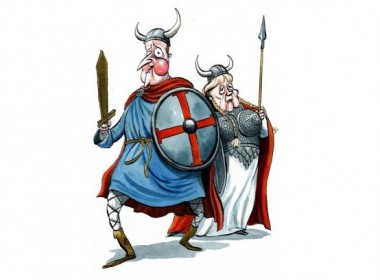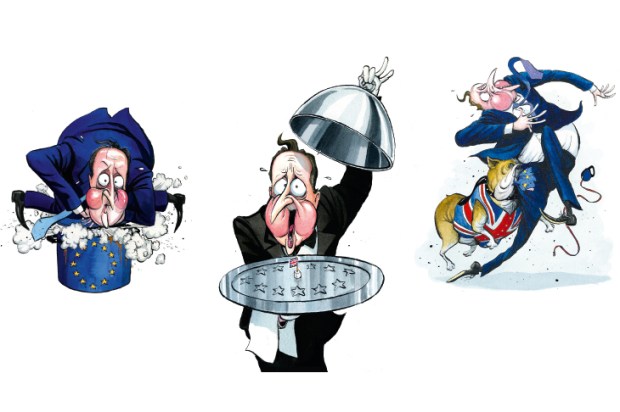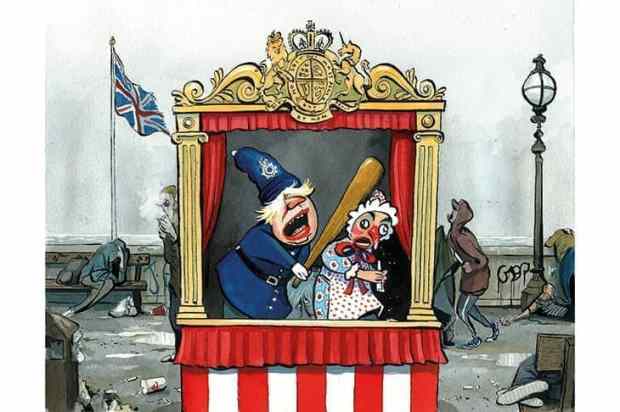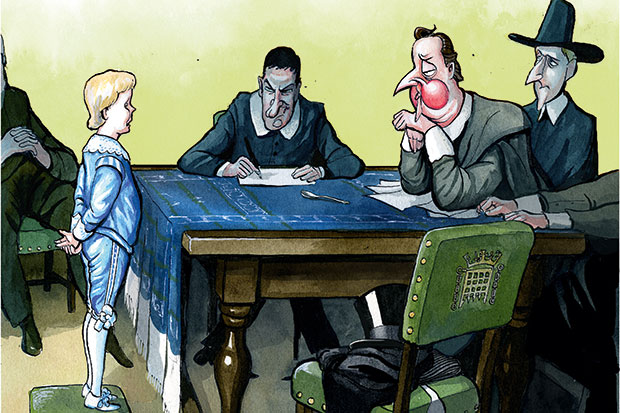Listen
If David Cameron were to divide Europe up, he’d make some crude distinctions. There would be the basket cases, like Italy, Spain, Greece, France — examples, by and large, of how countries should not be run. Then there’d be the former Soviet bloc, sceptical about Brussels because they recently escaped a remote, controlling bureaucracy and don’t want to repeat the experience. Then come the good guys, the people with whom he intends to reshape the continent: the Germans, the Dutch and the Scandis. This is the group that the Prime Minister has started referring to as his ‘Northern Alliance’.
Mr Cameron has, until now, had little interest in the machinations of the European Union. To him, politics is primarily social — so he makes alliances by making friends. When François Hollande turned up for a visit, he was taken down to the pub and served a ploughman’s lunch. Angela Merkel, by contrast, is being treated like a homecoming empress. Plans for her visit included an address to both Houses of Parliament, lunch at 10 Downing Street and an audience with the Queen at Buckingham Palace. This pageantry is all the more surprising given the fact that Cameron doesn’t have any favours to ask — at least, not now. He’s buttering her up for the big one, when he wants to change the terms of Britain’s EU membership and have the result of his efforts put to the country in a referendum.
What might Cameron want then? He has yet to say, which makes it difficult for the Germans to support him. This is where Mark Rutte, the Prime Minister of the Netherlands, comes in. Cameron has known him for years, and once bent the Commons’ rules by giving him lunch in a dining room reserved for MPs. For an enthusiastic Anglophile like Rutte, such gestures are much appreciated. He was in Britain again last week, invited to Chequers for talks and dinner. The two leaders have much to talk about (besides floods) — both are moderates in their mid forties, leading coalitions and implementing austerity at home. Both are facing challenges from Eurosceptic populists: Nigel Farage in Britain, and Geert Wilders in the Netherlands.
Both want radical reform to the European Union, but Rutte has a hard plan — one that could easily double as a Cameron manifesto. He wants to put Brussels back in its box, giving national parliaments the power to veto EU directives they don’t like. If more than a third of member states dislike an EU idea, he says, it should bite the dust. He also plans a new manifesto for the EU: it should stop spewing out directives, and act only when national parliaments cannot. Less interference, less spending, fewer diktats, more democracy. Precisely the sort of package that Cameron would like to offer in a referendum — albeit with a British stamp on it.
Angela Merkel should have no problem with any of these reforms. This is what Cameron would see as the ‘Northern Alliance’ idea of how countries should be run in a modern Europe — and the consensus extends well beyond the current political elite. A YouGov poll this week for Open Europe shows a clear majority in both Britain and Germany agreeing with the Rutte proposal: that more policies should be decided by national parliaments, and fewer by the EU level. When Brits were asked which European leader they’d most like to replace Cameron, Mrs Merkel came top and Mr Rutte second. We are, it seems, all northerners now.
The attraction of a Northern Alliance will, of course, be tied to the Scandimania now sweeping Britain. Never has there been so much appetite for all things Nordic: the crime novels, the clothes, the music, the television box-sets and even the booze. The traditional images of Sweden — blondes and Abba — have been joined by Spotify and The Killing. Even Ed Miliband has made a pilgrimage to Stockholm to see what ideas he can bring back to Britain. A creative explosion is under way in northern Europe, and it captures the imaginations of politicians as much as it does those of consumers.
Not so long ago, the phrase ‘Swedish model’ was taken to mean some kind of third way between capitalism and communism. But this changed in the financial crisis of the early 1990s, after which Sweden was rewired — and a new Swedish model created. It was one where private companies would run hospitals, the underground and even schools. There was a radical individualism, a stress on balanced budgets and decentralisation. This led to an abundance of creativity when it came to policy, which has seen Scandinavia supplant America as the lodestar for the British right. Michael Gove’s school reform is modelled on Sweden’s ‘free school’ experiment, which moved parents and children from struggling council-run schools to a new breed of independently run schools. The most popular chain, International English Schools, reject the ‘progressive’ consensus in Sweden (which involves peculiar ideas about ‘student democracy’) and offer an untrendy traditional education. High demand means free schools educate a fifth of all Swedish sixth-formers. In Britain, there are now 174 free schools.
But what captivates Cameron most is how Scandi conservatives can win elections in left-wing countries. He is close to the Swedish Prime Minister Fredrik Reinfeldt, who (like Rutte) is a moderniser in his forties. He responded to the financial crisis not with bailouts but with a permanent tax cut for the low paid — the equivalent to an extra month’s salary every year. He went into the Swedish elections boasting that ‘we are the new workers’ party’ and became the first conservative prime minister ever to be re-elected there.
So it was no surprise, earlier this week, when Cameron’s Conservatives also declared themselves to be ‘the workers’ party’. The next slogan to look out for is ‘People, Not Billions’ — this was the war cry of Erna Solberg, nicknamed ‘Iron Erna’, who became Norway’s second female prime minister last October. Her slogan was intended to assure voters that Norway’s Conservatives think individuals are every bit as important as fiscal matters. She won on an agenda of privatisation, lowering top tax rates, and supply-side reforms.
At times, it seems Cameron is trying to make Britain an honorary member of Scandinavia. For the last three years, he has convened a UK-Nordic-Baltic Conference, now known as ‘Northern Future’. This has the benefit of involving another reformer, Estonia, whose solution to the economic crisis was a substantial cut in government spending while keeping taxes at a flat 21 per cent. Its reward was almost four straight years of extraordinary economic growth. Its experience does help remind Cameron that the conservative formula of sound money, regulatory restraint and low taxes works.
At these conferences, Cameron’s self-styled Northerners discuss everything from green energy to childcare provision. But the fact they’re discussing anything at all is significant. The left-leaning Swedish newspaper Dagens Nyheter smelt a rat: ‘Behind the scenes, this Northern Alliance will debate ways to frustrate a “French model” for the European economy,’ it wrote. Cameron was taking a risk, it said, in setting up a group that could be seen as a splinter group from the EU.
He is guilty as charged. The Prime Minister does not share Blair’s fantasies about somehow ‘leading’ Europe. His Europe is one where countries have the freedom to adopt whatever policies they like. If the old Protestant, now secular Europe wants to focus on work, smaller government, jobs and personal liberty then it should be free to do so. Just as the old Catholic, now secular Europe (France, Spain, Italy) should be free to adopt dirigiste politics, and see how they work out. If M. Hollande wants France to join Club Med, and to tax the wealth creators all the way to Russia, good luck to him — but he must leave the northern countries to pursue a different path.
The Prime Minister should, however, be careful what he wishes for. The Nordic model is not without its problems. Free schools mean the occasional school failure, which brings bad headlines (rumour has it that a Swedish-run free school in Britain is soon to be judged by Ofsted to be ‘inadequate’). And because Scandinavian workers enjoy substantial protection (it’s very expensive to fire anyone), employers are reluctant to hire. Newcomers to the jobs market — young people and immigrants — find themselves on the wrong side of a wall built around the world of employment. When immigrants ended up rioting on the streets of Stockholm last summer, it was a fairly clear sign of trouble in this Nordic paradise.
What’s more, Reinfeldt may have pushed his tax-cutting agenda as far as it can go in Sweden. Voters now seem more concerned about Sweden’s public service provision, and Anders Borg, who recently chopped off his trademark ponytail, spent last week outlining plans to raise taxes (on booze and tobacco). There is no sense of economic crisis in Sweden, but there is a feeling that after eight years of Reinfeldt it might be time for a change. Opinion polls suggest he’s on course to lose the September elections.
In the Netherlands, Mark Rutte faces similar problems: the coalition he leads is volatile, and he may struggle to last another three years. Even Estonia’s supply-side magic seems to be fading — it said earlier this month that economic growth has unexpectedly ground to a halt. Mrs Solberg, whom Cameron entertained a few weeks ago in No. 10, is of limited strategic use as Norway is not an EU member.
There are some Conservatives who believe all this is too important to leave to personal chemistry, and that a British negotiator should be appointed to start work on the deal that would be put to the country in a referendum. Sir John Major has openly made this case. But Cameron, I understand, is less certain — believing that making such an appointment would be to delegate too huge a responsibility. In the end, he believes the Prime Minister and Foreign Secretary will have to renegotiate British membership — and it will occupy their time if the Tories should win the next election. Besides, who knows what Europe will look like by 2017?
Here lies Mr Cameron’s problem. He has gathered together a group of like-minded Europeans, who have a plausible and radical agenda to reshape the EU. He has successfully built a Northern Alliance — but he doesn’t need it now. He needs it in the run-up to his 2017 referendum. Between now and then lie the Swedish, French, Dutch and UK elections. It could well be that Mrs Merkel is visiting Britain at a rare moment in history when conservative stars are aligned. By 2017, as Cameron knows, things may look very different.
Got something to add? Join the discussion and comment below.
Get 10 issues for just $10
Subscribe to The Spectator Australia today for the next 10 magazine issues, plus full online access, for just $10.
You might disagree with half of it, but you’ll enjoy reading all of it. Try your first month for free, then just $2 a week for the remainder of your first year.














Comments
Don't miss out
Join the conversation with other Spectator Australia readers. Subscribe to leave a comment.
SUBSCRIBEAlready a subscriber? Log in